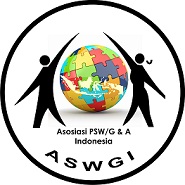IDENTITAS ETNIK DALAM PERILAKU FATHERING
Abstract
Abstrak
Setiap individu akan belajar dari kondisi yang ada dalam lingkungan budayanya. Informasi karakteristik etnik dalam suatu budaya tertentu akan dipelajari dan tertanam dan saat dewasa, disadari atau tanpa disadari akan mempengaruhi individu melakukan identifikasi dalam rangka memperkuat identitas etnik yang melekat pada dirinya. Seorang laki-laki saat menjadi seorang ayah mentransmisi segala nilai-nilai budaya dalam dirinya dalam bentuk sikap dan perilaku pengasuhan pada anaknya sebagai peneguhan identitas etnik yang terlekat dalam dirinya. Inilah yang melatarbelakangi penelitian untuk mengetahui identitas etnik dalam perilaku pengasuhan oleh para ayah pada etnik Batak dan para ayah etnik Minang. Hasil penelitian menunjukkan bagaimana identitas etnik tergambar dalam perilaku pengasuhan yang dilakukan baik oleh para ayah suku Batak maupun para ayah suku Minang sesuai dengan identitas etnik yang melekat.
Abstract
Each individual will learn from the conditions that exist in his cultural environment. Information on ethnic characteristics in a particular culture will be studied and embedded to influence individuals to identify in order to strengthen the ethnic identity attached to them. A man when he becomes a father transmits all the cultural values in him in the form of attitudes and nurturing behavior to his children as a confirmation of the ethnic identity inherent in him. This is the background of research to determine ethnic identity in parenting behavior of Batak ethnic fathers and Minang ethnic fathers. The results of the study show how ethnic identity is reflected in the parenting behavior carried out by both Batak tribal fathers and Minang tribal fathers according to the inherent ethnic identity.
Keywords
Full Text:
PDFReferences
Anderson, Stephen A. (2003). Family Interaction : A Multigenerational Developmental Perspective, (Boston : Allyn and Bacon).
Dagun, Save M. (2013). Psikologi Keluarga. (Jakarta : Rineka Cipta).
David C. R., Nestor L. Lopez. (2004). "Parental Discipline and Externalizing Behavior Problems in Childhood : the Roles of Moral Regulation and Child Gender", Journal of Abnormal Child Psychology, Vol. 32, No.4, 2004, p. 369-383
Dufur, Mikaela J. (2010). "Sex Differences in Parenting behaviors in single mother and single father house hold, Journal of Marriage, 72, 5, Research Library, 2010, p.1092 - 1106
Kwon, Jae,.Yung. (2014). "Heteresexual Gender Relations and Masculinity in Father who smoke", Research in Nursing and Health, 37, 2014, p.392
Novianti, Evi. (2014). "Pola komunikasi Pasangan antar etnik Sunda Minang di Bandung (studi etnografi komunikasi pasangan pedagang Sunda Minang perantauan dalam pembentukan etnik di Pasar Baru Trade Center", Jurnal Kajian Komunikasi, Volume 2, no.2, 2014, p.166.
Nurhayani. (2019). Fathering Styles Of Moslem Families Perceived From Personality Types In Sumatera, Islam Realitas : journal of Islamic & Social Studies, Vol. 5, Nomor 1, Januari - Juni 2019, p.14
Pauline, G. Boss.et.all. (1993). Source of family theories and methods : a contextual approach (New York : Plenum Press).
Pew Research Center, (2013). The New American Father. Diakses dari : http://www.pewsocialtrends.org/2013/06/14/the-new-american-father/
Rahman, Putri Lia. (2012). "Gambaran Pola Asuh orangtua pada masyarakat Pesisir Pantai. Predicara, Vol.1, no.1 September. Universitas Sumatera Utara, h. 26.
Sasaki, Takayuki. (1997). What it means to be a good father : a test of identity theory. http://hdl.handle.net/2152/21924
Sears, David O., Freedman, Jonathan L. (1994). Psikologi Sosial, Jilid 2. Alih Bahasa : Michael Adriyanto (Jakarta: Erlangga)
Suciati, Rina., Ivan Muhammad Agung. (2017). "Perbedaan Ekspresi Emosi pada orang Batak, Jawa, Melayu dan Minangkabaru", Jurnal Psikologi, Vol.12, no. 2, 2017, 99-108
Tribun-Timur.com. (2015). Negeri Tanpa Ayah, 27 Februari 2015, Diakses dari : http://makassar.tribunnews.com/2015/02/27/negeri-tanpa-ayah
Zoja Luigi. (2018). The Father : historial, psychological and cultural perspectives (revised edition), English translation by Henry Martyn. (New York : Routledge).
DOI: http://dx.doi.org/10.30829/jgsims.v2i1.9638
Refbacks
- There are currently no refbacks.
Copyright (c) 2021 Journal of Gender and Social Inclusion in Muslim Societies

This work is licensed under a Creative Commons Attribution-ShareAlike 4.0 International License.
Pusat Studi Gender dan Anak Universitas Islam Negeri Sumatera Utara
Jl. Williem Iskandar, Pasar V Medan, Medan Estate 20371
» Tel / fax : (061) 6615 683 /




